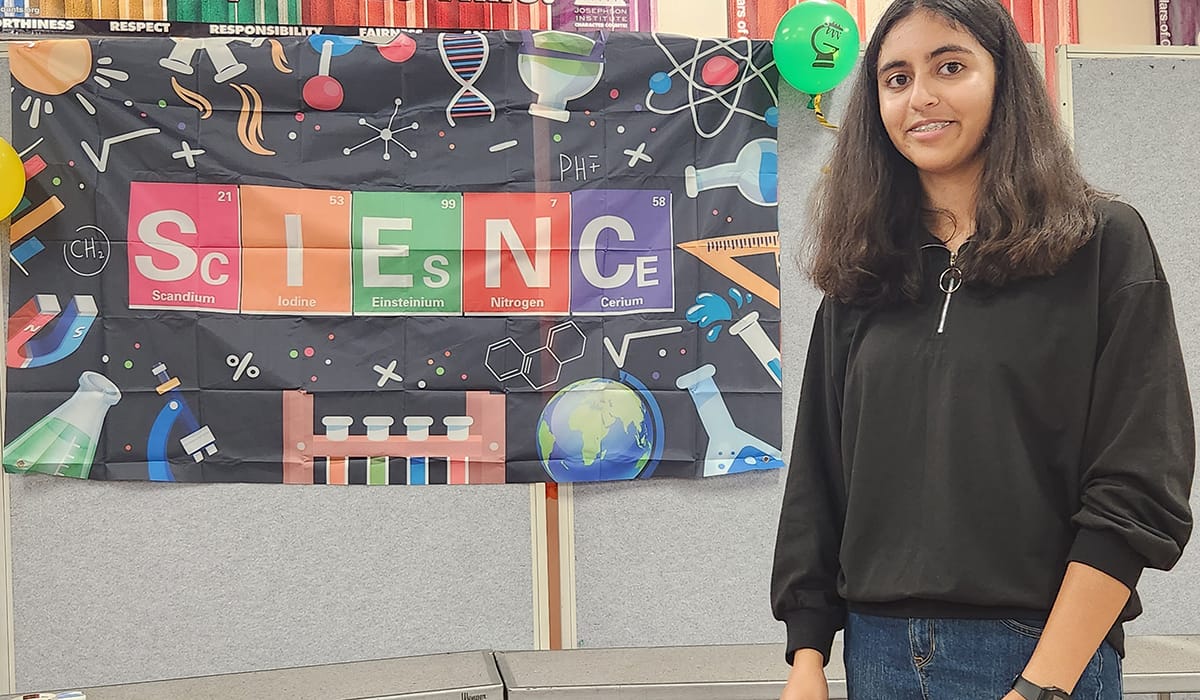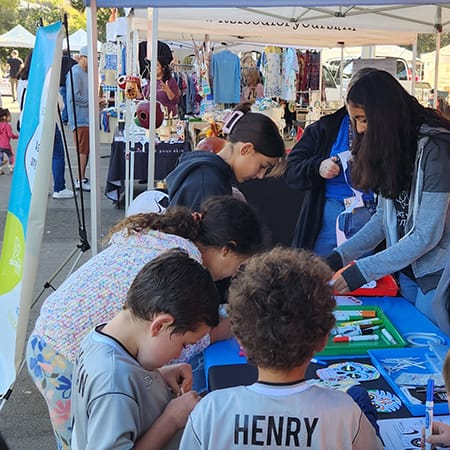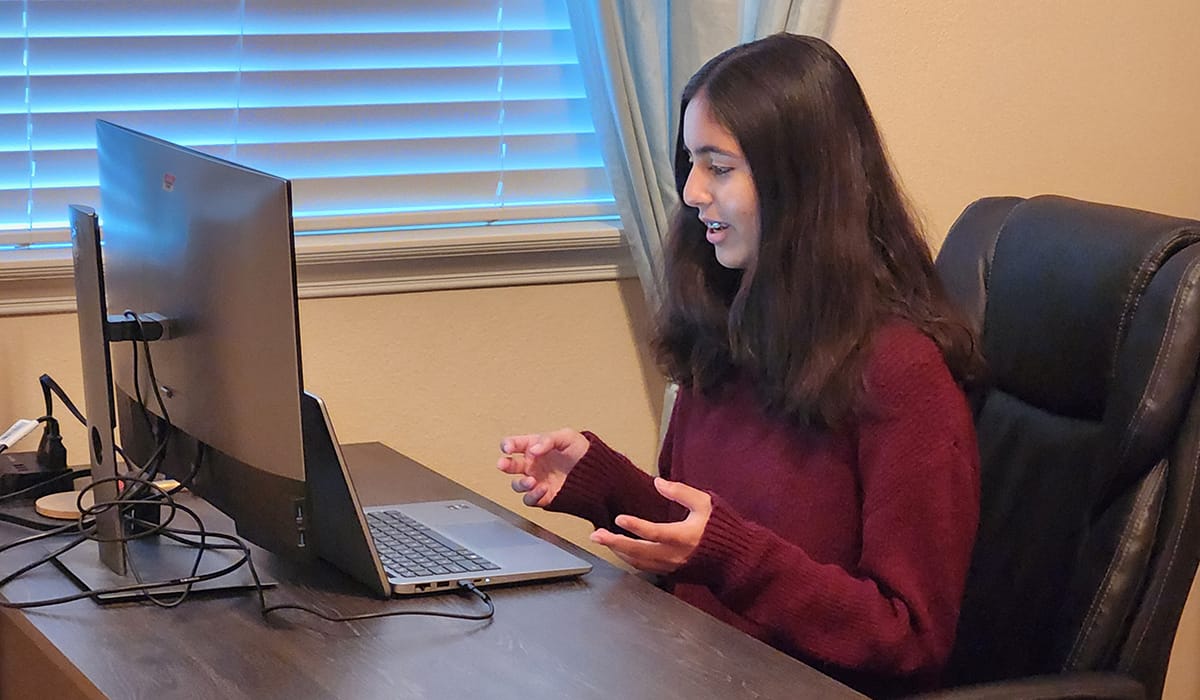Nonprofit Founder Helps Illuminate Paths in STEM Education Around the Globe

Meet Daily Point of Light Award honoree Saanvi Dogra. Read her story, and nominate an outstanding volunteer or family as a Daily Point of Light.
In a world rapidly advancing in science and technology, the importance of equitable science education cannot be overstated. Saanvi Dogra, a pioneering spirit and one of the founding members of Science Nexus, stands at the forefront of this educational revolution. Her vision of leveraging an experiential learning model to democratize science education for underserved children globally is not just innovative but transformative.
Saanvi’s dedication to empowering youth from all walks of life—particularly first-generation students, individuals with disabilities and other marginalized groups—reflects a deep commitment to fostering curiosity, innovation and self-sustainability. Science Nexus, under Saanvi’s leadership, is helping to narrow the global science education gap. The organization’s mission is to provide inclusive and experiential science education to underserved children, thereby sparking an interest in STEM fields that could change their futures.
Saanvi’s approach goes beyond traditional classroom learning; it’s about engaging children in hands-on activities that make science alive, relatable and fascinating. This experiential model encourages students to explore, ask questions and discover the world of science in a way that textbooks alone cannot achieve.
With Saanvi at the helm, Science Nexus has seen remarkable growth, establishing 12 chapters across nine different countries. This expansion has not only spread the joy of science education but also impacted more than 12,000 children worldwide. Each chapter serves as a local hub where volunteers, led by Saanvi’s guidance, bring customized science workshops to children, addressing their unique educational needs and cultural contexts. The success of these chapters stands as a testament to the scalability and adaptability of Science Nexus’s educational model.
Read more about Saanvi’s belief in the transformative power of STEM education – a legacy that will undoubtedly inspire countless others to follow in her footsteps.

Tell us about your volunteer role.
Science Nexus is a nonprofit organization dedicated to furthering inclusive science education for underserved children around the globe through our experiential learning model, compassionate service and global network to foster curiosity and create an interest in STEM. As a leader and co-founder, I help establish chapters and student ambassadors, create customized science workshops for unique needs, overlook logistics, plan outreach activities, connect with other organizations for partnership opportunities and manage our website and social media platforms.
Why is this issue so important to you?
Despite frequent advances in modern science, many communities still face a large gap in science education that prevents them from keeping up with these innovations. For example, some countries, such as India or Pakistan, demonstrate a stark gender disparity in STEM education. In Ghana, a large portion of adolescents are out of school. In Honduras, the frequent natural disasters constantly disrupt students’ education.
Science Nexus is working towards providing these students with an equal access to science learning resources and opportunities that can transform their lives, inspire future generations of scientists and innovators, and create lasting positive changes for their communities. Through our global network of dedicated volunteers, we aim to empower youth from all walks of life, including first generation students, individuals with disabilities and those from underserved areas or other marginalized groups, helping them thrive in a rapidly evolving scientific landscape.
What inspires you to volunteer?
When I was younger, I always enjoyed hands-on experiments. I played around with different variables, testing how one change could alter the entire project. I wanted to enable other students to experience that same joy and child-like excitement. I’m inspired to volunteer by seeing students’ faces light up whenever they understand a new scientific principle or successfully complete an experiment they’ve been attempting for an hour. Through Science Nexus, I am able to develop critical thinking skills and spark curiosity for the sciences in communities around the globe.
What inspired you to get started with this initiative?
My passion in science led me to participate in the local San Diego science fair annually since middle school. Being part of the leadership board now, I had the opportunity to mentor students from underserved schools who wanted to participate but lacked resources to pursue their ideas. As I guided my mentee through the fair, she used to confidently tell me she wanted to be a scientist. Working with her, I realized small help could go a long way; she was able to win first place for her project. Recognizing my ability to make a difference in her journey, inspired me to create Science Nexus with the goal of helping other children with similar dreams.
Earlier this year, I had the opportunity to present my research at the International Science and Engineering Fair, with students from 80 other countries all on one single platform. Regardless of country, culture or background, everyone at the fair bonded through our common passion for scientific research. Talking to some of the participants, I realized that lack of access to education is a real issue around the world, motivating me to expand Science Nexus efforts globally.
What are your long-term plans or goals for the organization?
So far, we have been able to successfully establish 12 chapters across nine different countries. Working with a total of 70 volunteers and 15 organizations, we have created an impact for more than 12,000 children around the globe. In the next few months, we plan to recruit more volunteers in our existing chapters and hold more fundraising activities to provide educational resources such as robotics kits, science equipment and books.
What’s been the most rewarding part of your work?
The most rewarding part of my work is being able to create an interest in STEM in students who haven’t been exposed to these experiments before. For example, in the Eastern Pangasinan Agricultural College in the Philippines, Science Nexus has been mentoring students over the course of several months to develop their own research idea, make a poster and present it at a local science fair. We received feedback from the school principal that the students had never had the opportunity to do a hands-on project like this before, and that after this experience, they showed a growing interest in science-related courses at their school.

What have you learned through your experiences as a volunteer?
As a volunteer, I’ve learned that collaboration is crucial to expanding your cause. One person cannot organize every workshop or contact schools in every country, so relying on multiple people with diverse skill sets or partnering with pre-established organizations helps you build a better network with a greater impact around the world.
I have also learned the importance of compassion and adaptability through Science Nexus. Every single community has a different need that must be met to bridge the gap in science education, and tailoring workshops to those needs is crucial in lifting underserved communities.
Tell us about future partnerships, programs or events that you are excited about.
In April, Science Nexus is planning a Family Science Night in San Diego. The event will consist of several booths with different interactive experiments on robotics, biology, chemistry and more for whoever is interested in attending or learning more about science. We have also recently partnered with Computers without Borders. Together, we plan on refurbishing several personal computers and sending them to locations in Belize, Guatemala and Nicaragua to establish better technological education.
Why is it important for others to get involved with causes they care about?
When people advocate for a cause they care about, their actions can help other communities and raise awareness about otherwise hidden issues. People will have more empathy as they learn more about other parts of the world, creating a more harmonious society. Volunteering also helps build crucial leadership skills that motivate and inspire others to take action.
Any advice for people who want to start volunteering?
For anyone who wants to start volunteering, I think everyone should pursue something they are passionate about and will work to solve. Not only does volunteering give you a purpose, but also gives you the chance to grow as a person with your understanding of other people. You should never hesitate to start and try something new.
Do you want to make a difference in your community like Saanvi? Find local volunteer opportunities.
